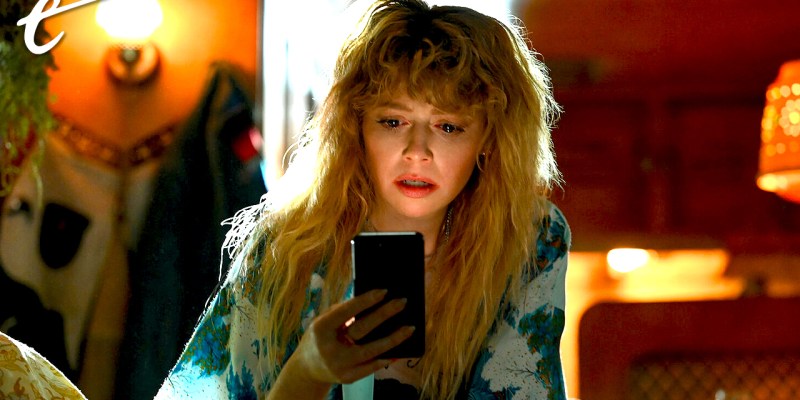This article contains spoilers for the first four episodes of Poker Face on Peacock.
The first episode of Poker Face, “Dead Man’s Hand,” ends with Charlie Cale (Natasha Lyonne) smashing her cell phone with a rock.
There is an obvious plot motivation for this scene. Charlie just played a pivotal role in the death of casino operator Sterling Frost (Adrien Brody) and the destruction of that casino’s reputation. Charlie is being pursued by Cliff (Benjamin Bratt), a ruthless murderer employed by Sterling’s father (Ron Perlman). Destroying the phone makes it harder to find Charlie. It allows her to step off the grid, to disappear into the vast American wilderness.
However, the destruction of the phone is more than just a plot mechanic or an invocation of television nostalgia. It is also a key thematic choice. The destruction of the phone is in many ways a rejection of everything that the phone represents. In particular, it is a rejection of the augmented reality that Charlie experiences on the device, the passive routine of doomscrolling and outrage. Charlie is no longer going to experience the world through her phone. She is going to engage with it.
This is baked into the premise of Poker Face. Charlie is a woman with a unique ability. She can tell whenever anybody is lying. She demonstrates “an almost supernatural infallibility” when it comes to determining truth. The show is deliberately and cleverly vague on the mechanics at work. Pressed to explain it to Sterling, Charlie simply states that she can tell “just that something is off, that’s the best way to describe it.” It’s a skill rooted in observation. She watches, she listens, she judges.
Poker Face is a murder mystery show, but it is one that isn’t especially interested in the cold and forensic mechanics of police procedurals. The show is not a traditional “whodunnit,” in which the audience is introduced to a large cast early in the episode and then has to figure out from the evidence which party is responsible. It’s not a guessing game. Instead, each episode opens by depicting the crime: the murderer, the motivation, and their method.
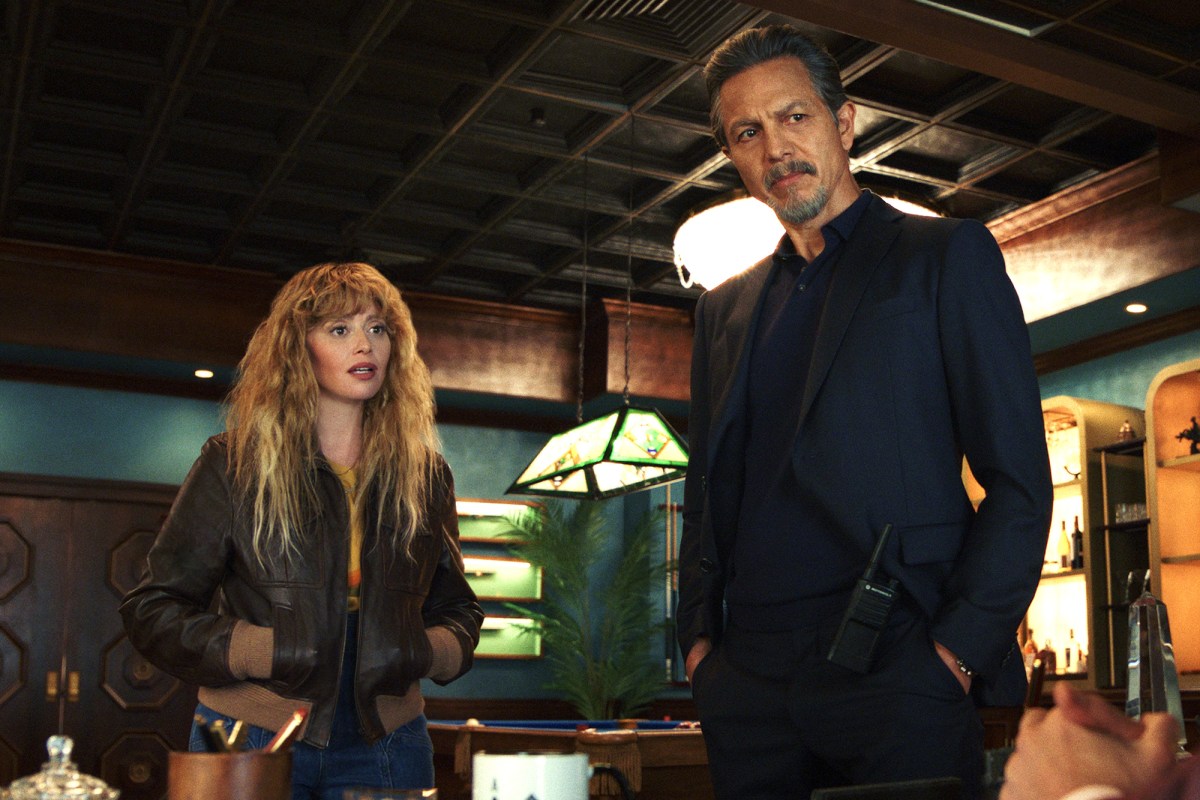
Creator Rian Johnson has never been interested in the idea of a murder mystery as a puzzle box. In Glass Onion: A Knives Out Mystery, gentleman detective Benoit Blanc (Daniel Craig) proves inept at Among Us and contemptuous of Clue. In the second episode of Poker Face, “The Night Shift,” Charlie is proud of herself for solving a “circle the difference” challenge on a diner menu, only for the waitress (Chelsea Frei) to scold her, “It’s for kids.” For Johnson, these stories are not ornate and abstract puzzles.
Instead, Poker Face suggests that the art of detection is about observing human nature. As Sterling explains early in “Dead Man’s Hand,” Charlie developed a reputation in Las Vegas based on her skills at the poker table. There was speculation that she was cheating by reading the cards. Sterling tests her, asking her to tell whether he’s bluffing or not. “You’re not reading the cards,” he realizes. Charlies responds, “How could I read the cards?” Sterling explains, “You’re reading me.”
Poker Face is built around the importance of watching and observing. Sterling conducts a lot of his business in the “crow’s nest” behind his office, which is a viewing platform hidden behind a two-way mirror overlooking the floor of his casino. He watches everything. He draws Charlie into a plan to hustle one of his customers, Kazimir Caine (Eddie Gorodetsky). Charlie will simply observe him through a feed from cameras hidden in his room. “Can you do your thing over video?” Sterling asks.
This idea of watching and observing simmers through Poker Face. “The Night Shift” takes place at a truck stop, where Jed (Colton Ryan) climbs on top of his uncle Abe’s (John Ratzenberger) repair shop and spies on his surroundings with gigantic binoculars. “I can see everything from up here,” Jed tells Damian (Brandon Micheal Hall). “Like I’m a god.” In some ways, Jed exists as a foil to Charlie. “You know what you’ve got?” Damian asks Jed, rhetorically. “Perception.” Perception goes a long way.
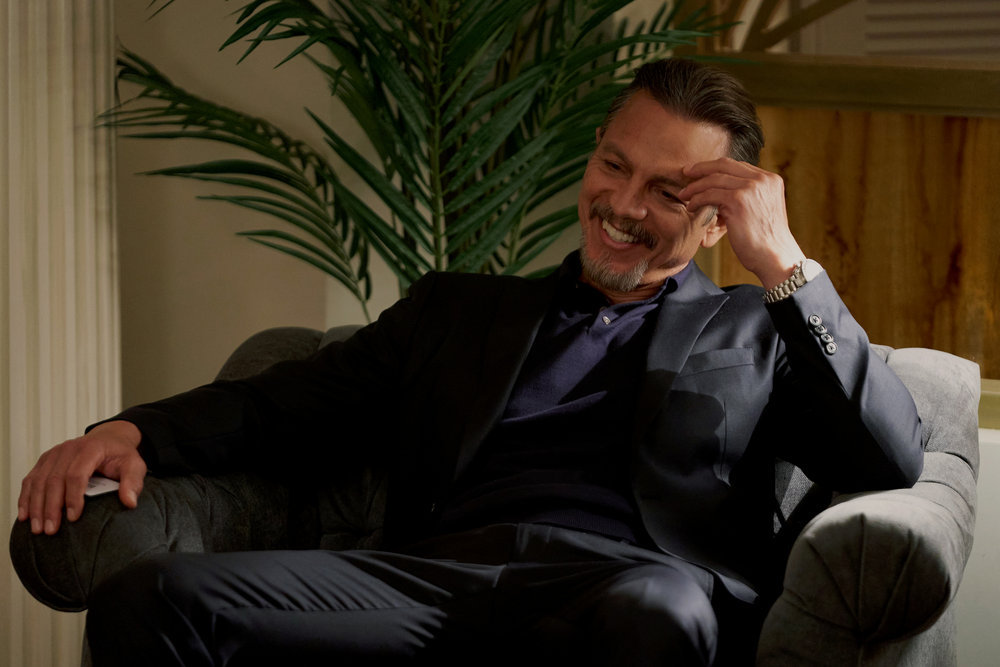
Poker Face suggests that Charlie’s gift is rooted in a fundamental empathy and humanism, a natural curiosity about the world and about other people that gives her a unique insight. In the show’s third episode, “The Stall,” Charlie spends time working at a Texas BBQ with a chef named George (Larry Brown). George argues that cooking is a full sensory experience. “Good barbecue is like a symphony playing on all five senses, and a skilled conductor can pick out every note,” he contends.
In the world of Poker Face, the act of watching is tied to empathy. Film critic Roger Ebert famously contended that cinema is “a machine that generates empathy,” and Poker Face seems to agree. In “The Night Shift,” a trucker named Marge (Hong Chau) confesses that the first time she cried was watching Bambi. In “The Stall,” Charlie lends George DVDs of Babe, Charlotte’s Web, and Okja, and these alone are enough to turn the BBQ chef into a vegan.
There is something romantic in this. To look at somebody, to really see them, is to forge an empathic connection with them. It’s a clever basis for an episodic series, which is introducing its audience to new characters and new settings each week. This empathy is key to Johnson’s storytelling. None of the murders in Knives Out, Glass Onion, or the first four episodes of Poker Face are crimes of passion or emotion. Instead, they are motivated by greed, with money clouding that empathy.
As the series progresses, one of Poker Face’s smarter tricks is the way in which it plays with the audience’s empathy. The fourth episode, “Rest in Metal,” opens by assuming the audience’s empathy for Ruby (Chloë Sevigny), a washed up punk rocker who never made any money off her greatest hit. The band’s new drummer, Gavin (Nicholas Cirillo), is presented as Ruby sees him: an annoyance. As the episode’s opening act plays out, the audience roots for Ruby as she plots against Gavin.
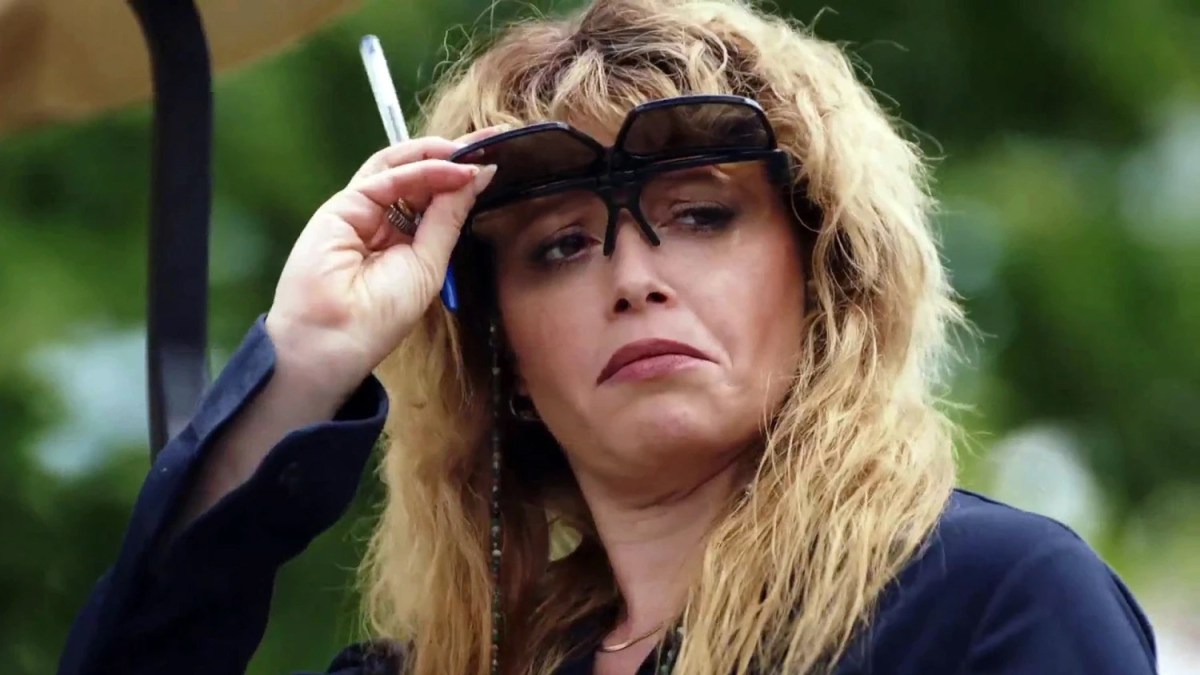
However, as Ruby conspires to murder Gavin and steal his song, “Rest in Metal” flashes back to view events from Charlie’s perspective. While Ruby was too self-absorbed to see Gavin as a person, Charlie actually takes an interest in the sweet young idiot. Indeed, part of what endears Gavin to Charlie is the way in which he pays attention to the world around him, hearing rhythm in the falling rain or composing lyrics from the slogans on whatever’s in his pocket, in the style of Zooropa.
Poker Face isn’t naïve. It understands that empathy is often a choice, that the way that these stories are framed often involve a choice — conscious or not — about who is most deserving of compassion. Characters like Jed — young men harboring simmering resentment and entitlement — are often given a sympathetic focus even after they do terrible things. At the end of “The Night Shift,” Abe pointedly switches off his hearing aid rather than listen to his nephew’s self-serving rationalizations.
However, perception is not enough in itself. This is a theme that Poker Face shares with both Knives Out and Glass Onion, mysteries that aggressively deconstruct the idea of the detective as an impassive observer of objective facts. It is not enough to observe. There is a moral obligation that comes with watching and seeing. To put it simply, Charlie learns over the course of Poker Face that, on witnessing injustice, there is a responsibility to act.
This all circles back to the phone. In “Dead Man’s Hand,” Charlie sees the world through mediated images: video monitors, two-way mirrors, and her phone screen. Johnson and cinematographer Steve Yedlin reinforce this with their shot choices and compositions. The show’s first case revolves around the murder of Charlie’s friend Natalie (Dascha Polanco) and Natalie’s husband Jerry (Michael Reagan). When Charlie reads about their death, the headline is reflected in her eyes.
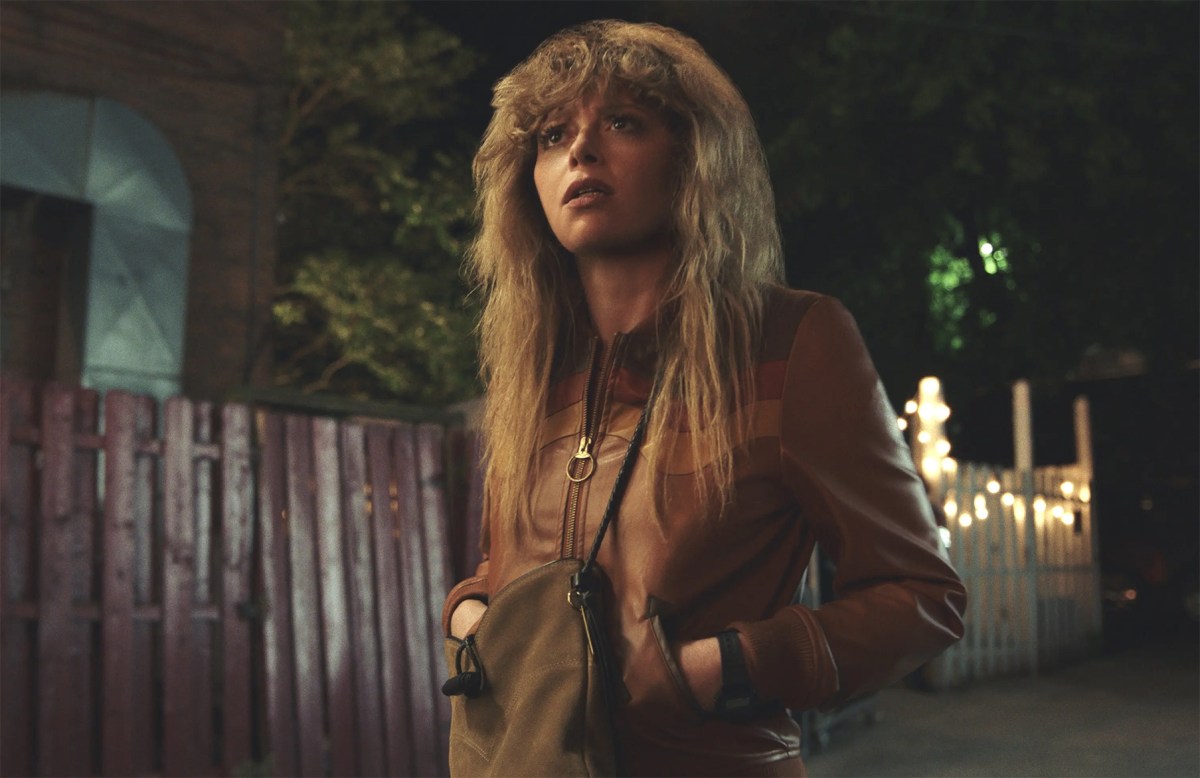
In “Dead Man’s Hand,” Charlies consumes a constant diet of media that reminds her of how awful the world is. “Charlie, I’m not having a good morning,” Natalie complains on the ride they share to work. “I don’t need this right now. Why do you listen to that stuff?” She challenges, “Yeah, what’s the point? You can’t do anything about it.” Later that day, Sterling chides Charlie for living “in a cage.” He asks, “You’ve got this gift, and my dad made sure you’ll never use it again. Aren’t you pissed?”
Indeed, sometimes just watching is enough to be a crime. In the opening scene of “Dead Man’s Hand,” and so the opening scene of Poker Face, Natalie is cleaning Caine’s suite and discovers images of child pornography on his open laptop. It’s a deliberate choice as the show’s first real crime, an offense where the mere act of looking renders an individual complicit and culpable. There is no passive observation. To see something so horrid is to render a person guilty.
In fact, Johnson commits to this idea in “The Night Shift,” which he wrote. Jed’s observation is just voyeurism. He sits on the roof with his binoculars, and he watches Sara (Megan Suri), the girl who works at the convenience store. He uses the knowledge that he gains from watching to cover up his murder of Damian, manipulating the CCTV footage and taking advantage of blind spots to frame Marge. Watching isn’t always to be celebrated. It can become something monstrous.
Ultimately, Natalie sees something and makes the decision to act on what she has witnessed. She reports what she saw on Caine’s laptop to Sterling. Because exposing Caine would disrupt Sterling’s plans to swindle him using Charlie’s gift, Sterling arranges to have Cliff murder Natalie to cover it up. When Charlie pieces this all together, she laments that Natalie “did the thing I’m always yelling at my phone about. She did the right thing when she saw something awful, and she actually did something about it.”
As such, the smashing of Charlie’s phone at the end of “Dead Man’s Hand” is an important statement of intent from Poker Face, one that is very much of a piece with Johnson’s other work in the mystery genre in Knives Out and Glass Onion. It rejects the idea of the detective as a passive observer, but it’s also an appeal to action. Charlie no longer experiences reality through the remove of a screen. She is part of the world. That comes with a moral obligation not just to witness, but to act.
